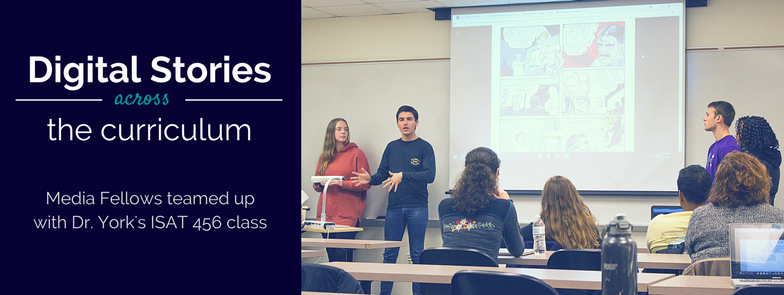Dr. York brings digital storytelling to ISAT
ISAT course teams up with Media Fellows
News
SUMMARY: DigiComm Media Fellows support digital storytelling in Dr. York's Bio Ethics Course.
Issues of ethics plague the scientific community, forcing researchers to consider the moral and physical implications of decisions made in the name of scientific progress. This semester, students in ISAT 456 had a chance to develop final projects exploring different topics of interest—from human physical and cognitive augmentations to genome editing—with Dr. Emily York and DigiComm tutor Teresa Cummings.
“The students put them together in two weeks! They did an amazing job,” said Teresa at their final presentations. Students used digital tool Atavist to produce a range of presentations on current issues in science. “The class focuses on ethical implications of different scientific discoveries and procedures within the community.”
The class positions students to engage with critical thinking and communication skills in a scientific setting. Media fellow Teresa articulated that “regular ISAT classes require students to answer only to questions: what is it and what does it affect? But when you bring in the A in STEAM, [students] also have to answer the questions why is it important and what will we do about it?” This class takes place against a backdrop of national debate as to the necessity of arts and humanities inclusion in STEM curriculums. STEM, standing for science, technology, engineering, and mathematics, is part of a national effort to increase global competitiveness in the workforce as well as research and development.
Dr. York articulated that she sees “communication skills and multimodal communication as really important for today’s scientists, for several reasons, [mainly that] scientists need to be able to effectively communicate to various publics for the sake of science, democracy, and their own careers...Communication is key to critical thinking, and critical thinking is key to responsible innovation.” She found the media fellowship opportunity presented in DigiComm to be a pedagogical bridge between integrating foundational communication skills and multi-modal education. Teresa’s know-how paired with Dr. York’s curriculum allowed the course to venture into questions of bioethics while allowing the students to engage their education in a new, exciting way.
Ultimately, Dr. York thinks the class created a space for critical thinking and ethical questioning really well. “In doing so,” Dr. York said, “they considered what precisely is required in order to create biotechnologies that help support a flourishing society.”
